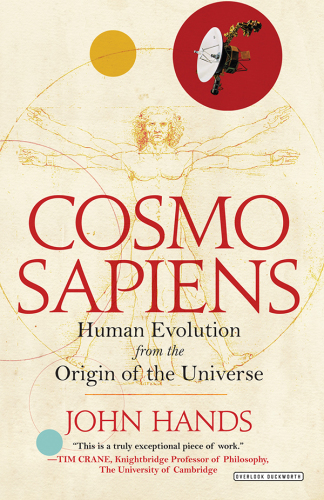
Cosmosapiens
Human Evolution from the Origin of the Universe
- اطلاعات
- نقد و بررسی
- دیدگاه کاربران
نقد و بررسی

Starred review from November 30, 2015
In this audacious, ambitious, and philosophically completist study, Hands (Housing Co-operatives) leads an interdisciplinary search through all the current human knowledge that may help answer two burning questions: What are we, and where do we come from? Hands proceeds from the basics of cosmology, chemistry, biology, ethology, philosophy, physics, and more as he addresses historical concepts and current orthodoxies, testing for explanatory and predictive power before he advances to newer and more exotic ideas. The result is a pearl of dialectical reasoning between Hands and the most celebrated experts he can find. In today’s age of specialization, readers will welcome this throwback to the days of the well-informed layperson, conversant and opinionated in a variety of topics. Hands feels that science is the right tool for allowing humans to understand ourselves, but he highlights controversies at the leading edge and explicitly closes his research with a summary of science’s limitations. He ends with a bold, definitive list of everything he thinks we know about ourselves and delivers a short answer to his guiding question: “We are the unfinished product of an accelerating cosmic evolutionary process characterized by collaboration, complexification, and convergence, and the self-reflective agents of our future evolution.” Hands grounds his musings in logic and scientific fact to produce a thoughtful treatise for the eternally curious.

October 1, 2015
Hands has spent the last 10 years assembling a critical overview of scientific orthodoxy in an attempt to answer the fundamental questions "what are we?" and "why are we here?" The author, who has had managerial responsibilities in the British government and has tutored in physics and management studies for the Open University, acknowledges the help of more than 50 accredited scientists with expertise in the fields he explores. The first target of his scrutiny is modern cosmologists, who face the dilemma of attempting to explain the putative origin of the universe in a big bang. Hands finds their efforts to be fundamentally inadequate due to their necessary reliance on both Einstein's general relativity theory and the Standard Model of particle physics. Even though "each has been extremely successful in making predictions that have been verified by observation and experiment within its own realm," they are incompatible theoretically. Another of the author's bones of contention concerns the rate of expansion of the universe and whether it is constant or cyclical. He examines various attempts to explain the process, including string theory, loop theory, and the existence of undetectable dark matter and energy. In the author's view, an even more fundamental issue is that scientists today mistakenly "conflate mathematical theory with scientific theory." Moving on to the origins of life on Earth, Hands suggests that Darwin's reputation is overblown and finds fault with the current "gene-focused paradigm." Although the author refutes the claims of intelligent design proponents, he accepts the views of the Jesuit Pierre Teilhard de Chardin that the evolution of self-reflective humans has created a new stage in the evolution of the biosphere by our use of tools, artistic creations, and philosophy. Hands speculates on new stages of development involving "psychic" energy, and he provides an extensive glossary, which is helpful given the amount and depth of the material, much of which is esoteric. A compendious work that will intrigue serious readers; others may find it overlong and too comprehensive.
COPYRIGHT(2015) Kirkus Reviews, ALL RIGHTS RESERVED.

November 15, 2015
With an ambitious goal of presenting a grand synthesis of what science can (and cannot) explain about who we are and what we came from, Hand (a self-described "evaluator of scientific theories and hypotheses about human evolution") examines the state of scientific knowledge in three broad areas: the emergence and evolution of matter (cosmology), of life, and of Homo sapiens. For each of these areas, the author explains the relevant theories, hypotheses, and models (such as the Big Bang, string theory, and natural selection) and then critiques them--pointing out the ways in which they are contradicted by evidence, there is no evidence, their conceptual flaws, or how they succeed or fail as scientific explanations. Ultimately, the author concludes that current knowledge about these great cosmic evolutionary forces is quite sketchy and may be beyond the scope of scientific explanation. VERDICT This is a thoughtful, well-written volume, but at 650 scientifically dense pages it's not an easy read (the cosmology section is especially complex). Recommended as a reference to be consulted rather than a narrative to be read cover to cover.--CLK
Copyright 2015 Library Journal, LLC Used with permission.

December 15, 2015
On a self-described quest to find out what human beings are and where they came from, Hands conducts a critical inquiry into what science can legitimately say about these questions. Starting right at the beginning, with the big bang, Hands surveys the reigning theoretical models, finding most of them wanting, for various reasons, as scientific explanations of the origin of the universe. Professional cosmologists Hands consulted did not, he admits, think much of his criticisms. He gamely ripostes that their dismissals of his points are indicative of belief in their own theories, not evidence for them. He also received the same general reaction from paleontologists and evolutionary biologists who replied to faults he finds in their fields. It is not surprising that after his march through astrophysics, the origin of life, and the emergence of human consciousness, Hands ultimately answers that we will likely never have answers of scientific exactitude to his initial questions. Written with an outsider-like, philosophy-of-science attitude, Hands' encyclopedic work will most likely appeal to readers interested in how scientists truly know what they claim to know.(Reprinted with permission of Booklist, copyright 2015, American Library Association.)




دیدگاه کاربران